There are all sorts of circumstances that people point to as justification for their support of abortion. Since none of these circumstances are sufficient to justify the killing of human beings after birth, they’re not sufficient to justify the killing of human beings before birth.
When it comes to abortion, there is no shortage of “What if…?’s.” Just when it seems the injustice of abortion has been firmly established, you’ll hear things like: “What if the woman was raped?”, “What if she can’t afford a child?”, or “What if the baby is deformed?”
These questions don’t address the fundamental ethics of abortion, but they do introduce a host of difficult variables. Some people appeal to them earnestly. Many do not. These “hard cases” are often used as a last defense by those who actually believe abortion should be legal no matter what the circumstances. They appeal to these more emotionally-charged circumstances in an attempt to move the focus away from the heart of the issue – which is the humanity of unborn children and the violence of abortion.
The best way to expose the fallacy of such claims is to simply broaden the context and apply them to children outside the womb. No matter how you frame it, the difficulty that these circumstances present do not justify the death of an innocent human being.
What if the child is unwanted?
One of the favorite mantras of abortion advocates around the country is “Every Child a Wanted Child.” It sounds noble enough, until you realize what their solution to unwantedness is. If a child isn’t wanted, they argue, then it shouldn’t be born. The problem, of course, is that the child is already conceived, and the only way to keep said child from being born is to kill it. How do they justify such violence? Often by arguing that it is better for the child to be dead than for the child to be unwanted.
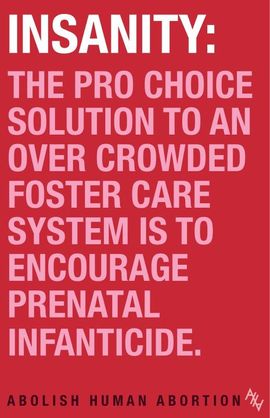 This is a bogus argument. It doesn’t work for the simple fact that no one makes such an argument about children after birth. Is certain death really the answer to potential neglect or abuse?
This is a bogus argument. It doesn’t work for the simple fact that no one makes such an argument about children after birth. Is certain death really the answer to potential neglect or abuse?
If someone’s right to life truly were established or removed based simply on their “wantedness,” what would that mean for those in foster care, the homeless, the aged or the infirm?
In the broadest sense, the whole discussion of “wantedness” ignores a substantial reality. Even if the biological parents want nothing to do with their offspring, there are families all over the nation waiting desperately to adopt a baby, families who are willing to adopt diseased babies of any race or ethnicity.
Something as subjective as “wantedness” can never be the basis for granting someone the right to life, and abortion advocates know this. They don’t argue that mothers should be free to kill their “unwanted” children after birth because they know these children are living, human beings with full rights of personhood. The only reason they argue that mothers should be free to kill their unwanted children before birth is because they’re ignoring the scientific reality that these children, too, are living, human beings. The question is humanity, not wantedness.
What if the mother can’t afford a child?
Abortion advocates often argue that it is acceptable for a woman to abort her pregnancy if she cannot afford to raise a child. While they are careful to use noble and compassionate language, they are essentially arguing that if a baby is going to be too expensive, the mother has a right to kill it. Such rationale falls apart on many levels, but we’ll start with the most fundamental. Like so many abortion arguments, this one assumes something about the unborn embryo or fetus that it hasn’t proved. It assumes, in fact, the very thing that it must prove before the argument can hold any water.
No one makes such an absurd and heartless argument because we all know that no amount of financial hardship is sufficient rationale for killing another human being, particularly an innocent child.
On a practical level, there are more crisis pregnancy care centers in America today than there are abortion providers. They all function to help bring women through their pregnancies by providing them the emotional and financial assistance they need to carry to term and, if need be, place for adoption (which would relieve all future financial obligation). When help is needed, help can be found.
The only reason anyone uses the financial hardship argument to try and justify abortion is because they are assuming that human beings in the womb are qualitatively different from human beings out of the womb. But until abortion advocates can prove this to be so, financial distress can never justify abortion. Poverty is not the issue. The humanity of the unborn child is.
What if the baby is handicapped, disabled, diseased, or deformed?
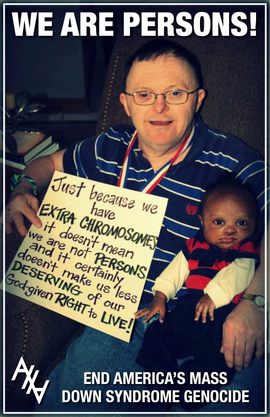 As shocking a reality as this is, abortion advocates would have you believe that putting a child to death is an acceptable solution to that child’s physical or mental disability. In much the same way that they argue for aborting children who might grow up in poverty, abortion advocates also argue for the right to abort children who might grow up with a disability, as if disease or handicap somehow strips a person of their right to live and relegates them to a life of misery. Such a suggestion is barbaric and inhumane and has no place in a just society.
As shocking a reality as this is, abortion advocates would have you believe that putting a child to death is an acceptable solution to that child’s physical or mental disability. In much the same way that they argue for aborting children who might grow up in poverty, abortion advocates also argue for the right to abort children who might grow up with a disability, as if disease or handicap somehow strips a person of their right to live and relegates them to a life of misery. Such a suggestion is barbaric and inhumane and has no place in a just society.
There are children of all ages, and adults too, who are alive today and are living through all manner of disease and disability. Do these physical limitations make them less human? Is killing those who are sick really an acceptable way to treat sickness?
The only reason anyone suggests for children before birth what they would never suggest after birth is that they are again assuming what they have not proven. Anyone who argues that abortion is a necessary safeguard against a life of suffering and disability is assuming that the unborn child is not yet a living human being. But this is exactly the point that they must prove before they can even begin to make such claims.
Furthermore, this pressure to abort handicapped babies is built largely on conjecture, on the mere “likelihood” that a child has some kind of disability. Often, the tests prove wrong, and more often still, these children, if allowed to live, end up with lives of joy and happiness that far exceeds those of their “more healthy” peers. Suffering and hardship are not bad things. They are means to a greater end, a crucial part of the human journey. Anyone who tries to eliminate suffering by killing the “sufferers” is establishing a horrific trend. It is not for us to decide who has a life worth living and who doesn’t, and we certainly wouldn’t want someone else making that decision for us!
In the end, this whole question of disability is a mere disguise to divert attention from abortion’s true agenda. The fact is, abortion advocates support killing babies whether they have disabilities or not. They’re not arguing that abortion should be limited to fetuses with severe handicaps. They’re arguing that the mother, alone, should have the right to kill her baby for any reason under the sun, and that is the most shocking reality of all.
The arguments for killing a handicapped unborn child are valid only if they also apply to killing born people who are handicapped.
Aborting children on the basis of their handicaps jeopardizes the rights of born people who are handicapped.
People with disabilities have rightly been working hard to achieve recognition for their needs. To justify abortion on the grounds that the baby is or might be disabled is to express a bigotry against people with disabilities which should not be countenanced in an egalitarian, democratic society. [1]
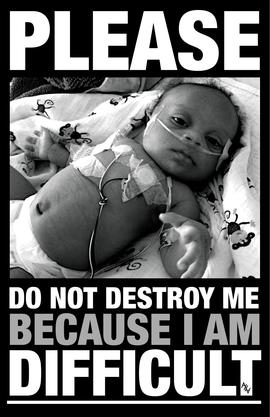 Suppose your six-year-old becomes blind or paraplegic. He is now a burden to his parents and society. Raising him is expensive, inconvenient, and hard on your psychological health. Some would say that he does not have a significant “quality of life.” Should you put him to death? If a law were passed that made it legal to put him to death, would you do it then? If not, why not?
Suppose your six-year-old becomes blind or paraplegic. He is now a burden to his parents and society. Raising him is expensive, inconvenient, and hard on your psychological health. Some would say that he does not have a significant “quality of life.” Should you put him to death? If a law were passed that made it legal to put him to death, would you do it then? If not, why not?
You would not kill your handicapped child, because you know him. But killing an unborn child just because you have not held him in your arms and can’t hear his cry does not change his value or mitigate his loss when he is killed.
What about the anencephalic child who doesn’t have a fully developed brain? Since he will die anyway, his parents often decide to have an abortion or allow his life to be taken in order to harvest his organs. It is one thing to know a child will probably die and another thing to choose to take his life. Many families have had precious and enriching experiences naming and bonding with an anencephalic baby. Then they experience healthy grief at the natural death of this family member. This is in stark contrast to the unhealthy grief and guilt that comes from denying a baby’s place in the family and actually taking his life.
The quality of a society is largely defined by how it treats its weakest and most vulnerable members. Killing the innocent is never justified because it relieves others of a burden. It is not a solution to inflict suffering on one person in order that another may avoid it. What defined Nazi Germany as an evil society was its wanton disregard for human life. That disregard surfaced in Hitler’s killing of 275,000 handicapped people before he began killing the the Jews.
Abortions due to imperfections have no logical stopping place; they will lead to designer babies, commercial products to be bred and marketed, leaving other people to be regarded as inferior and disposable.
In his testimony before Congress in 2000, Dr. Bernard Nathanson said: [2]
The geneticists are running wild…There’s something known as genetic enhancement that is being carried out on a large scale…. For example, if you want a child to be in the NBA and 6 feet 10 inches tall, at the embryo stage you’d ask that extra genes be put in for tallness. Or if you wanted extra memory so that you forget nothing, you put in more memory genes at the embryo stage.
Dr. Bernard Nathanson also went on to say:
All sorts of human mapping has been carried out. [Today, the entire human genome has been mapped out.] At the University of Utah, an artificial chromosome has been created that self-destructs on command if it is faulty or if it looks primitive to some future generation. I leave you to imagine what this could do and what the possibilities of such technologies are.
Ron Harris, a fashion photographer, recently began offering eggs from models for a fee of up to $150,000. Mr. Harris claims that his egg sale is an outgrowth of humans’ natural urge to mate with genetically superior people and produce babies with “evolutionary advantages.” [3]
What if the mother is addicted to drugs?
It is not uncommon to hear an abortion advocate incredulously ask something like this, “Do you really think a coke-addict should be forced to have a baby that will grow up being addicted to crack and living on the street?”
As with so many of the arguments that have come before it, it is assuming what it should be proving. There are children alive today who were born with drug addictions, and who are living with mothers who continue to use cocaine, and yet these children have every bit as much of a right to life as all of their more fortunate contemporaries. Drug addiction isn’t the issue, humanity is the issue.
Do we deal with drug addiction by killing everyone who is addicted to drugs? No we don’t. And we certainly wouldn’t suggest such treatment for those whose addiction is no fault of their own. The only reason abortion is offered as a legitimate solution for a child who may grow up addicted to narcotics is because those making the suggestion are ignorant (or worse) concerning the status of unborn children.
The tragic irony in America today is that, in most states, women can be prosecuted for “fetal abuse” if they take harmful drugs during their pregnancy, but these same women are perfectly free to hire someone to kill their baby if they so choose. Mothers are free to kill, but not free to harm?! The hypocrisy of such schizophrenic laws makes a mockery of justice. Embryos and fetuses should be protected from harm and death.
What if the woman was raped?
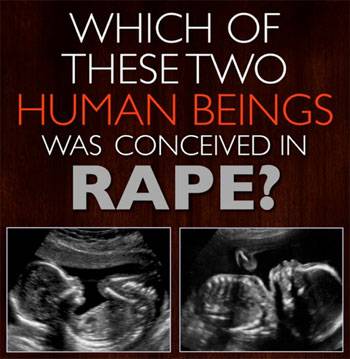 You can’t get very far in any discussion about abortion without considering the question of rape. Whereas the vast majority of pregnancies are the result of consensual sex, rape-based pregnancies present a unique dilemma. If a woman didn’t choose to engage in sex in the first place, should she have to carry to term a child that was the result of her forced union?
You can’t get very far in any discussion about abortion without considering the question of rape. Whereas the vast majority of pregnancies are the result of consensual sex, rape-based pregnancies present a unique dilemma. If a woman didn’t choose to engage in sex in the first place, should she have to carry to term a child that was the result of her forced union?
The question should become much clearer if we add in some hypothetical details. Let’s say the woman does carry her child to term and decides to raise her son herself. After five years, however, she decides that the little boy’s presence in her life is too much of a burden. He looks too much like his biological father. Should that mother have the right to kill her five year-old son who was born to her as a result of sexual assault?
Obviously not. No matter what the circumstances are regarding the little boy’s conception, he is a human being with a right to life that cannot be taken away from him. But what about before the child is born, does this change anything? No, it doesn’t.
Aborting a child conceived through rape simply extends this pattern of violence and victimhood. It does not “unrape” the woman, but it will almost certainly increase her regret and misery. Whereas rape is an act of violence for which she bears no responsibility, abortion is an act of violence for which she would be morally culpable.
Whenever abortion advocates bring up this question of rape, they do so disingenuously. The fact is, they think mothers should have the right to kill their unborn children no matter what the circumstances surrounding the pregnancy might be. They only ask about the “12 year-old girl forced to carry her father’s baby” because they know they can’t win the abortion debate on the merits. They appeal to the emotion of these extremely hard and rare cases because it helps mask their true agenda, which is abortion on demand.
Rape is never the fault of the child; the guilty party, not an innocent party, should be punished.
In those rare cases when a pregnancy is the result of rape, we must be careful who gets the blame. What is hard about this hard case is not whether an innocent child deserves to die for what his father did. What is hard is that an innocent woman has to take on childbearing and possibly mothering—if she decides to keep the child rather than choose adoption—for which she was not willing or ready. This is a very hard situation, calling for family friends, and church to do all they can to support her. But the fact remains that none of this is the fault of the child.
Why should Person A be killed because Person B raped Person A’s mother? If your father committed a crime, should you go to jail for it? If you found out today that your biological father had raped your mother, would you feel you no longer had a right to live?
Biblical law put it this way (Ezekiel 18:20):
The soul who sins is the one who will die. The son will not share the guilt of the father.
And (Deuteronomy 24:16):
Fathers shall not be put to death for their children, nor children put to death for their fathers; each is to die for his own sin.
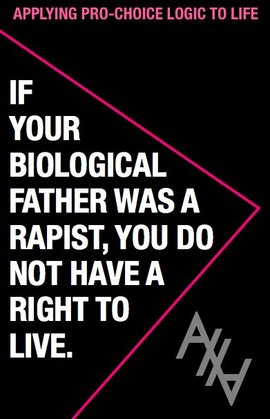 Civilized people do not put children to death for what their fathers have done. Yet aborting a child conceived by rape is doing that exact thing. He is as innocent of the crime as his mother. Neither she nor he deserves to die.
Civilized people do not put children to death for what their fathers have done. Yet aborting a child conceived by rape is doing that exact thing. He is as innocent of the crime as his mother. Neither she nor he deserves to die.
Rape is so horrible that we easily transfer our horror to the wrong object. We must not impose the ugliness of rape or incest upon either the innocent woman or the innocent child.
The woman is not “spoiled goods”—she is not goods at all, but a precious human being with value and dignity that not even the vilest act can take from her.
Likewise, the child is not a cancer to be removed, but a living human being.
By all means, let’s punish the rapist. (I favor stricter punishment of the rapist than do the pro-choice advocates I know.) But let’s not punish the wrong person by inflicting upon the innocent child our rage against the rapist.
The violence of abortion parallels the violence of rape.
One woman says: [4]
When a woman exercises her right to control her own body in total disregard of the body of another human being, it is called abortion. When a man acts out the same philosophy, it is called rape.
There is a close parallel between the violent attack on an innocent woman that happens in a rape and the violent attack on a innocent child that happens in an abortion. Both are done in response to a subjective and misguided sense of need, and both are done at the expense of an innocent person. The woman might not hate her child the way the rapist might hate his victim, but this is no consolation to the child. Regardless of the motives or disposition of his mother, he is just as brutally killed.
Abortion does not bring healing to a rape victim.
Imposing capital punishment on the innocent child of a sex offender does nothing bad to the rapist and nothing good for the woman. Creating a second victim doesn’t undue the damage to the first.
In February 2000 presidential candidate Alan Keyes addressed 120 middle school students in Detroit. A thirteen-year-old girl asked if his position on abortion included making an exception for rape. He spoke of the pain of rape, then said: [5]
But I don’t believe it is right to take that pain and actually make it worse. And to the burden of that rape down through the years, if that abortion takes place, do you know what I’m adding if I let you have an abortion? I’m adding the burden of that abortion. And at some point, the truth of God that is written on your heart comes back to you. And you’re wounded by that truth.
One feminist group says: [6]
Some women have reported suffering from the trauma of abortion long after the rape trauma has faded.
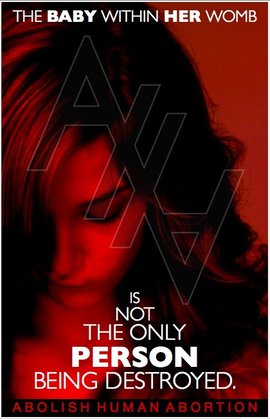 It is hard to imagine a worse therapy for a woman who has been raped than to add the guilt and turmoil of having her child killed. Even if we convince ourselves and her that it isn’t a real child or even her child, some day she will realize that it was. Those who advised abortion will not be there then to help carry her pain and guilt.
It is hard to imagine a worse therapy for a woman who has been raped than to add the guilt and turmoil of having her child killed. Even if we convince ourselves and her that it isn’t a real child or even her child, some day she will realize that it was. Those who advised abortion will not be there then to help carry her pain and guilt.
I have a dear friend who was raped and became pregnant as a result. Because of her circumstances, it wasn’t best for her to raise the child, but she gave birth, and the baby was adopted into a wonderful Christian family. She periodically has contact with them and her child.
It has not been an easy road, and I would say nothing to minimize her pain. The hardest part is not being able to raise her child, not hearing the footsteps in her home. Yet there is a bittersweet joy—the joy of knowing that God brought this beautiful little girl into the world through her and brought an immense happiness to the family who adopted her baby.
When I look at my friend, I find great comfort in knowing how she has brought joy to our Father in heaven, who has been pleased by her decisions and has brought character and beauty and life out of her suffering. Hers is not the suffering that comes with regret over having done the wrong thing to an innocent child. It is a suffering accompanied by the hand of God who comforts and sustains her and brings present waves of joy and contentment that are a foretaste of the fullness of joy in the heaven to come. But even now, the wonder she knows when she sees this delightful child overshadows the suffering she has gone through.
Francine Rivers’s novel, The Atonement Child, deals with this subject in a powerful way.
A child is a child regardless of the circumstances of his conception.
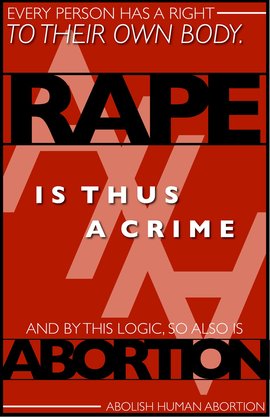 On a television program about abortion, I heard a man argue, “Anything of this nature has no rights because it’s the product of rape.” But how is the nature of this preborn child different from that of any other preborn child? Are some children more worthy of living because their fathers were better people? And why is it that prochoice advocates are always saying that the unborn child is really the mother’s, not the father’s, until she is raped—then suddenly the child is viewed as the father’s, not the mother’s?
On a television program about abortion, I heard a man argue, “Anything of this nature has no rights because it’s the product of rape.” But how is the nature of this preborn child different from that of any other preborn child? Are some children more worthy of living because their fathers were better people? And why is it that prochoice advocates are always saying that the unborn child is really the mother’s, not the father’s, until she is raped—then suddenly the child is viewed as the father’s, not the mother’s?
A child conceived by rape is as precious as a child conceived by love, because a child is a child. The point is not howhe was conceived but that he was conceived. He is not a despicable ‘product of rape,” but a unique and wonderful creation of God.
Women often think that a child conceived by such a vile act will be a constant reminder of their pain. On the contrary, the innocence of the child often has a healing effect. But in any case, the woman is free to give up the child for adoption, which may be the best alternative. Aborting the child is an attempt to deny what happened, and denial is never good therapy.
One woman told me, “A baby is the only beautiful thing that can come out of a rape.” Having and holding an innocent child can do much more good for a victimized woman than the knowledge that an innocent child died in an attempt to deny or reduce her trauma,
Where are we going to put all these people?
From time to time, abortion advocates will argue that abortion is a necessary mechanism for ensuring that the world’s population does not surge out of control. “Without abortion,” they ask, “where would we put all of these extra kids?”
Those who suggest that abortion is a good way to control the population will quickly assert that embryos and fetuses aren’t really human beings yet. This, of course, is the very point that they must prove before they can even begin to make such an argument. Since this is a point they can’t prove, they simply assume it to be true and move on.
Beyond the fact that overpopulation is not a sufficient moral rationale for killing off a portion of the population, the fact remains that the birth rate in the U.S. is only one of the factors influencing population growth. The Washington Post reports that 2006 marked the first time in 35 years that the U.S. fertility rate was high enough to sustain a stable population. [7]
From 1972-2005 the U.S. birth rate was below replacement (the rate necessary for a given generation to exactly replace itself). Why is that significant? The Post article comments further:
While the rising fertility rate was unwelcome news to some environmentalists, the “replacement rate” is generally considered desirable by demographers and sociologists because it means a country is producing enough young people to replace and support aging workers without population growth being so high it taxes national resources.
“This is a noteworthy event,” said John Bongaarts of the Population Council, a New York-based think tank. “This is a sign of demographic health. Many countries would like to be at this level.”
Europe, Japan and other industrialized countries have long had fertility rates far below the replacement level, creating the prospect of labor shortages and loss of cultural identity as the proportion of native-born residents shrinks in relation to immigrant populations. [8]
Reporting on the 2009 birth rate, the Centers for Disease Control notes that the U.S. birth rate is again in decline. Replacement levels were achieved in 2006 and 2007, but not in 2008 [9]
or 2009 [10]
. There was a 3-4% decrease in 2009, after a 1% decrease in 2008. Nevertheless, the U.S. Census Bureau reports that the U.S. population continues to grow by about one person every 12 seconds. [11]
Where is this growth coming from? USA Today tells us that between 2000-2005, roughly 7.9 million immigrants entered the United States. [12]
That is more than in any other five-year span in the nation’s history. Add to that the continued decline in the age-adjusted death rate, as reported in the Centers for Disease Control’s 2010 Health Report, [13]
and it becomes apparent that people in the United States are living much longer than they used to.
While birth rates have decreased, immigration and life expectancy has increased. Of the three factors that influence population growth, the number of babies being born is by far the least significant. And yet, does anyone suggest that killing immigrants or killing those over 65 is a reasonable way to limit population growth? No. So why would anyone suggest that killing unborn humans is a reasonable way to limit population growth?
But even if abortion is made illegal, won’t women just do it anyway?
This final, last-ditch plea is essentially a concession that, yes, abortion is an act of violence. Yes, it kills a living human being. Yes, it is wrong, BUT… “women will do it anyway” (so it should be legal). Obviously, this is a very dangerous way to argue public policy, and it doesn’t work for two reasons.
First, every form of lawless behavior could be rationalized with this same, “people are going to do it anyway” argument. Banks are robbed every day. Does that mean we should make bank robbery legal? How about rape? Should we do away with all anti-rape legislation because women will be raped whether it’s lawful or not? Does anyone suggest doing away with red lights since people run them all the time? The list could go on and on. Laws against anti-social behavior do not eliminate such behavior altogether, but they drive the numbers way down.
Ostensibly, this argument is made in the name of safety. “If women can’t abort legally, they’ll do so illegally, and it will be much more dangerous for them.” While this claim is not true, even if it were, nothing would change. Abortion would still be unjustified. Wouldn’t it be absurd to try and legalize armed robbery by arguing that granting such measures would make it much safer for the burglars to obtain what they’re trying to steal? Laws must protect the potential victim, not the potential assailant.
The second problem with this “women will do it anyway” argument is that it only holds true for a small percentage of the population. One need only look at the frequency of abortion since it was first legalized to see that the legality of abortion plays a huge role in establishing a woman’s willingness to choose abortion. The Centers for Disease Control, which has tracked U.S. abortion data since 1969, reports that “[after the] nationwide legalization of abortion in 1973, the total number, rate, and ratio of reported abortions increased rapidly, reaching their highest levels in the 1980s.” [14]
In 1970, there were 193,491 legal abortions. In 1973, the first year in which abortion was legal in all 50 states, there were 615,831. By 1981, that number had more than doubled. [15]
If the legality of abortion didn’t influence a woman’s willingness to choose abortion, then we wouldn’t have seen such a massive increase in abortion frequency during the years following its legalization. And should abortion again be outlawed at a future date, it would cease to be a viable option for most American women. The evidence is clear, both as it relates to abortion and as it relates to all other anti-social behavior. Legislation cannot eliminate such behavior altogether, but it can drive the frequency way down, sparing countless innocent victims from the injustice that would otherwise be theirs.
Abortion is ethically unjust because it kills an innocent human being, and none of the scenarios listed on this page can change this simple fact.
There are all sorts of circumstances that people point to as justification for their support of abortion. Since none of these circumstances are sufficient to justify the killing of human beings after birth, they’re not sufficient to justify the killing of human beings before birth.
References:
- Feminists for Life Debate Handbook (Kansas City, Mo.: Feminists for Life of America, n.d.), 18.
- “Dr. Bernard Nathanson Testifies Before Congress on Reproductive Technologies,” Washington Times, 10 February 2000.
- Carey Goldberg, “On Web, Models Auction Their Eggs to Bidders for Beautiful Children,” New York Times, 23 October 1999, All, excerpted from Dr. James Dobson, Family News from Focus on the Family, January 2000.
- Garton, Who Broke the Baby? 77.
- “Alan Keyes Continues His Campaign, Hammers on Abortion,” Prolife Infonet, www.prolifeinfo.org, 27 February 2000.
- Feminists for Life Debate Handbook, 14. Final Thoughts on the Hard
- Rob Stein. “U.S. Fertility Rate Hits 35-Year High, Stabilizing Population.” The Washington Post, http://www.washingtonpost.com/wp-dyn/content/article/2007/12/20/AR2007122002725.html (Dec 21, 2007)
- Ibid.
- Joyce A. Martin, et al. “Births: Final Data for 2008” National Vital Statistics Reports, Volume 59, Number 1, http://www.cdc.gov/nchs/data/nvsr/nvsr59/nvsr59_01.pdf (Dec 8, 2010), 1.
- Brady E Hamilton, et al. “Births: Preliminary Data for 2009” National Vital Statistics Reports, Volume 59, Number 3, http://www.cdc.gov/nchs/data/nvsr/nvsr59/nvsr59_03.pdf (Dec 8, 2010), 1.
- U.S. POPClock Projection, http://www.census.gov/population/www/popclockus.html (Sep 1, 2011)
- Haya El Nasser and Kathy Kiely. “Study: Immigration grows, reaching record numbers” USA Today, http://www.usatoday.com/news/nation/2005-12-12-immigration_x.htm (Dec 12, 2005)
- U.S. Department of Health and Human Services. Health, United States, 2010. http://www.cdc.gov/nchs/data/hus/hus10.pdf (February 2011), 135.
- Karen Pazol, Ph.D. et al. “Abortion Surveillance—United States, 2007” MMWR, http://www.cdc.gov/mmwr/preview/mmwrhtml/ss6001a1.htm?s_cid=ss6001a1_w (Feb 25, 2003), Table 2.
- Laurie D. Elam-Evans, Ph.D. et al. “Abortion Surveillance—United States, 2000” MMWR, http://www.cdc.gov/mmwr/preview/mmwrhtml/ss5212a1.htm (Nov 28, 2003), Table 2.
